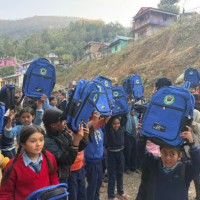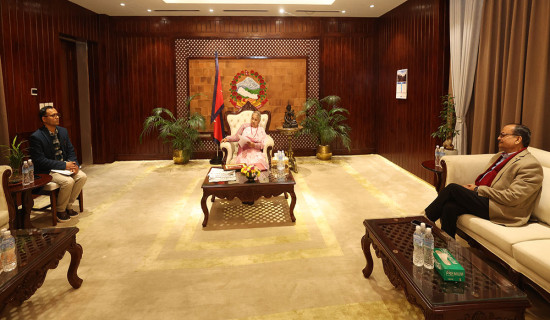- Wednesday, 7 January 2026
Experience Of Acquiring Citizenship Certificate
After turning 16, my parents suggested that I should apply for citizenship. Taking their advice, I decided to utilise my free time to obtain it, with their support throughout the entire process.
The process began with navigating the bureaucracy for two days at the Nagarjun Municipality, Ward No. 10, where I submitted various documents as part of the citizenship application process.
These documents included my birth certificate, my parents’ citizenship certificates, proof of residence, migration certificate, character certificate from my school, and receipt of payment of local tax, among others. Each document was an evidence to my identity and roots, connecting me to my family and my country.
On the 8th of August, my mom first took me to a nearby ward office for the recommendation letter. I had to fill out a lot of paperwork and go through a lengthy process. I learnt a lot about how government processes operate.
I had a mix filling at the ward office. I felt that the staff was helpful in providing me with guidance throughout the process, but I also feel that they could have been more proactive to help the service seekers. I faced a few problems. I found that the ward chairperson who is responsible for signing documents does not usually sit in the office, and this delayed the process.
After submitting my documents, I was issued a recommendation letter signed by the ward chairperson that I would need to present at the District Administration Office (DAO) in Kathmandu. The recommendation letter served as an official endorsement from the ward office, verifying the authenticity of my application and supporting my claim to Nepali citizenship.
On 13 August, I made my way to the DAO with the revised recommendation letter in hand.
Upon entering the DAO, I was directed to a waiting area where I joined others who were also there to receive their citizenship certificates. The atmosphere was a mix of excitement and nervousness as each of us waited for our turn to complete the necessary formalities. The process was well organised, with clear instructions displayed on notice boards and officials available to assist us at every step.
When my turn came, I approached the counter and submitted my recommendation letter along with the other required documents. The official behind the desk carefully reviewed each document, checking for accuracy and completeness. There was a thoroughness to ensure that all legal criteria were met.
Once the documents were verified, I was asked to move to the printing area and give a thump stamp to wait for my identity verification. After a brief waiting period, I was called into the next window, where the record was maintained in a register process.
Finally, the moment arrived when I was handed my citizenship certificate from the next window. Holding the certificate in my hands, I felt a deep sense of pride and accomplishment. This document, though simple in appearance, represented a profound connection to my country. It formally recognised my identity as a Nepali citizen, with all the rights and responsibilities that come with it.
Looking at the certificate gave me a feeling of acceptance. I could now formally participate in the democratic process, use public services, and advance the development of my country as a responsible citizen.
I realised that being a citizen is not just about holding a certificate; it is about understanding one’s rights, responsibilities, and role in society. This realisation led me to reflect on the importance of civic education. In Nepal, there is often a gap in civic knowledge among the general population. Many citizens are unaware of their rights and responsibilities, which can lead to a lack of engagement in civic life.
I believe that along with the issuance of citizenship certificates, there should be a concerted effort to educate citizens about their duties and rights. This could be achieved through civic education while giving a citizenship certificate.
Civic education is essential for fostering a sense of responsibility and active participation among citizens. It empowers individuals to make informed decisions, engage in the democratic process, and contribute to the well-being of their communities.
Receiving my citizenship certificate marked the beginning of a new chapter in my life that comes with rights and responsibilities.
Walking out of the DAO with a certificate in hand, I felt a renewed commitment to my country. It was a moment that strengthened my connection to the values of being a citizen.
-A-level, GEMS





-square-thumb.jpg)







-original-thumb.jpg)



